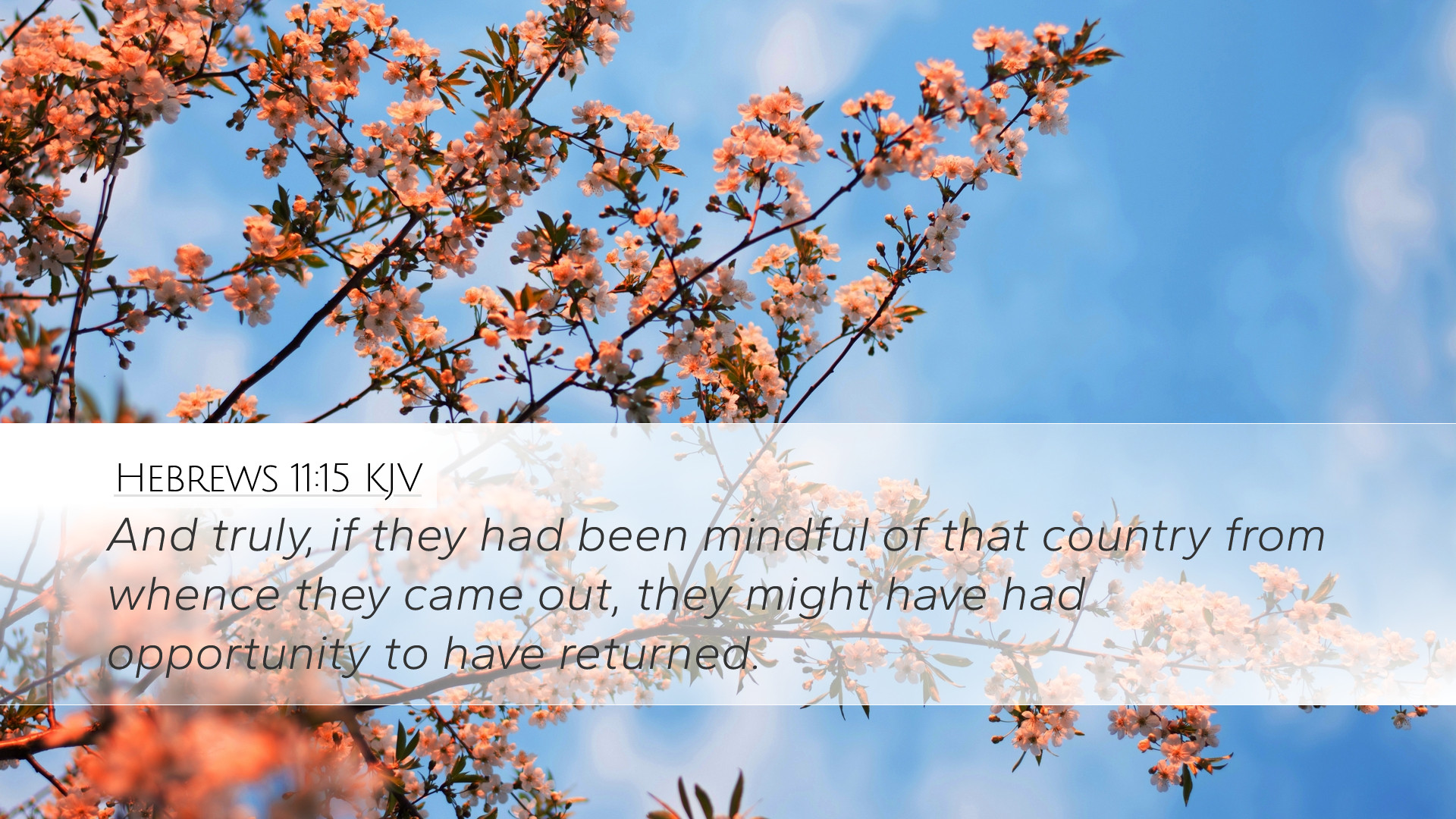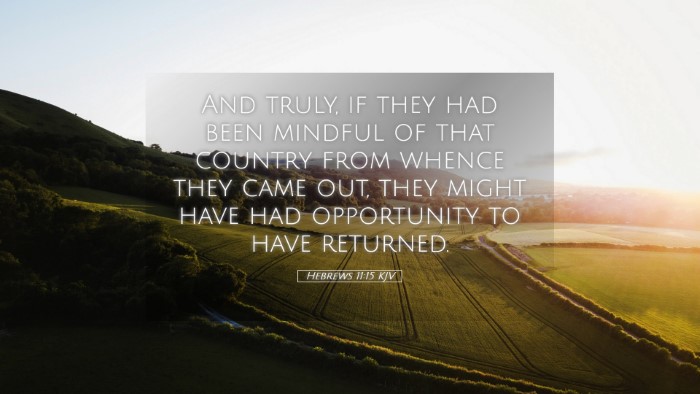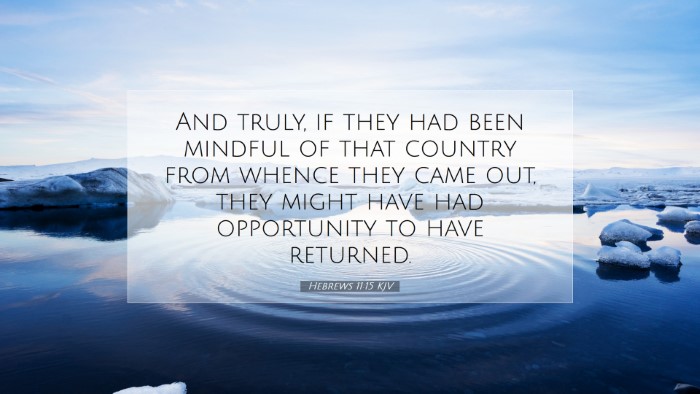Hebrews 11:15 Commentary
Bible Verse: "And truly, if they had been mindful of that country from whence they came out, they might have had opportunity to have returned." (Hebrews 11:15)
Introduction
The Epistle to the Hebrews is a profound exploration of faith and endurance, presenting figures from the Old Testament as exemplars of steadfastness. In this context, Hebrews 11:15 serves as a critical reflection on the nature of faith—particularly how it shapes one's perspective towards one's earthly origins and future hopes. This commentary draws insights from notable public domain theological works to unpack the depth of this verse.
Contextual Background
The surrounding verses in Hebrews 11 highlight various biblical figures who lived by faith—Abel, Enoch, Noah, Abraham, and Sarah. Each exemplifies a trust in God that transcended their immediate experiences, focusing instead on the promises of God and the heavenly country that awaits the faithful. In this verse, the author points out that the patriarchs had opportunities to return to their homeland but chose instead to look forward to the promises that lie ahead.
Analysis of Key Elements
Mindfulness of the Country
Albert Barnes observes that the term "mindful" indicates a deeper engagement and preoccupation with their former homeland. The patriarchs, though initially called out from it, could have easily returned if they had cherished those memories and desires above God’s promises. This notion invites readers to evaluate their own attachments to earthly matters compared to their commitment to God's eternal purpose.
Opportunity to Return
Matthew Henry expounds on the phrase “might have had opportunity to have returned.” He implies that even though they had the option to return to their past lives, their faith grounded them in a higher calling. They recognized that returning would signify a retreat from God’s promise. This aspect raises a powerful question for believers today: what opportunities to revert back to comfort zones might we be facing, and how do we assess them through the lens of faith?
The Significance of Faith’s Forward-Gaze
Adam Clarke comments on the essence of faith as not merely believing for the now but also holding onto the hope of what is to come. Implementing this to a practical spiritual life, he emphasizes that true faith is not just about what one leaves behind but what one pursues ahead. Faith requires a steadfast focus on the “city which hath foundations, whose builder and maker is God” (Hebrews 11:10), as the true home is not found in earthly dwellings but in divine promise.
Theological Implications
This verse encapsulates one of the central themes of Christian theology: the tension between temporal existence and eternal hope. The choice presented to the patriarchs reflects humanity’s continuous struggle between worldly allurements and divine aspirations. Such discernment has implications for pastoral ministry, theological education, and personal Christian living. Below are some thematic insights drawn from the commentaries:
- Attachment vs. Detachment: The patriots exemplify a necessary detachment from the old ways to embrace the call of God. This is pertinent for pastors who guide their congregants in letting go of worldly distractions to pursue spiritual growth.
- Faith in the Face of Uncertainty: The difficulty of leaving known comforts for the unknown is a real struggle in every era. This verse speaks to students and theologians who wrestle with doubts and questions about their faith journey.
- Hope for Future Generations: The faith exhibited is not for individual benefit alone but sets a precedent for generations. Church leaders should reflect on how their faith can influence the faith of others, emphasizing the lasting impacts of focused spiritual living.
Application for Today's Believer
Hebrews 11:15 challenges contemporary believers to consider where their true loyalty lies. As the world presents various opportunities for return to former ways—be it lifestyle choices, ideologies, or relational patterns—believers are confronted with the pivotal choice of faithfulness to God’s calling. Adapting the insights from the commentaries, consider the following applications:
- Reflect on Personal Past: Engage in reflective practice by examining what aspects of your past life draw you back and how these can detract from pursuing God’s plans.
- Encourage Community Mindfulness: Foster an environment within church settings that prioritizes forward-thinking faith rather than nostalgia for past comforts.
- Teach Future Generations: Share stories of faith that highlight the importance of looking forward, ensuring that younger generations grasp the essence of pursuing God against worldly distractions.
Conclusion
Hebrews 11:15 stands as a poignant reminder for Christians navigating their faith amidst an enticing world. By reflecting on the insights provided by esteemed theologians like Matthew Henry, Albert Barnes, and Adam Clarke, pastors, students, and scholars are encouraged to consider not just where they have been, but where their faith in God is taking them. The call to forward-looking faith is both a challenge and a comfort, assuring believers that their journey, despite its uncertainties, is leading them to a promised destination unlike any earthly comfort.


